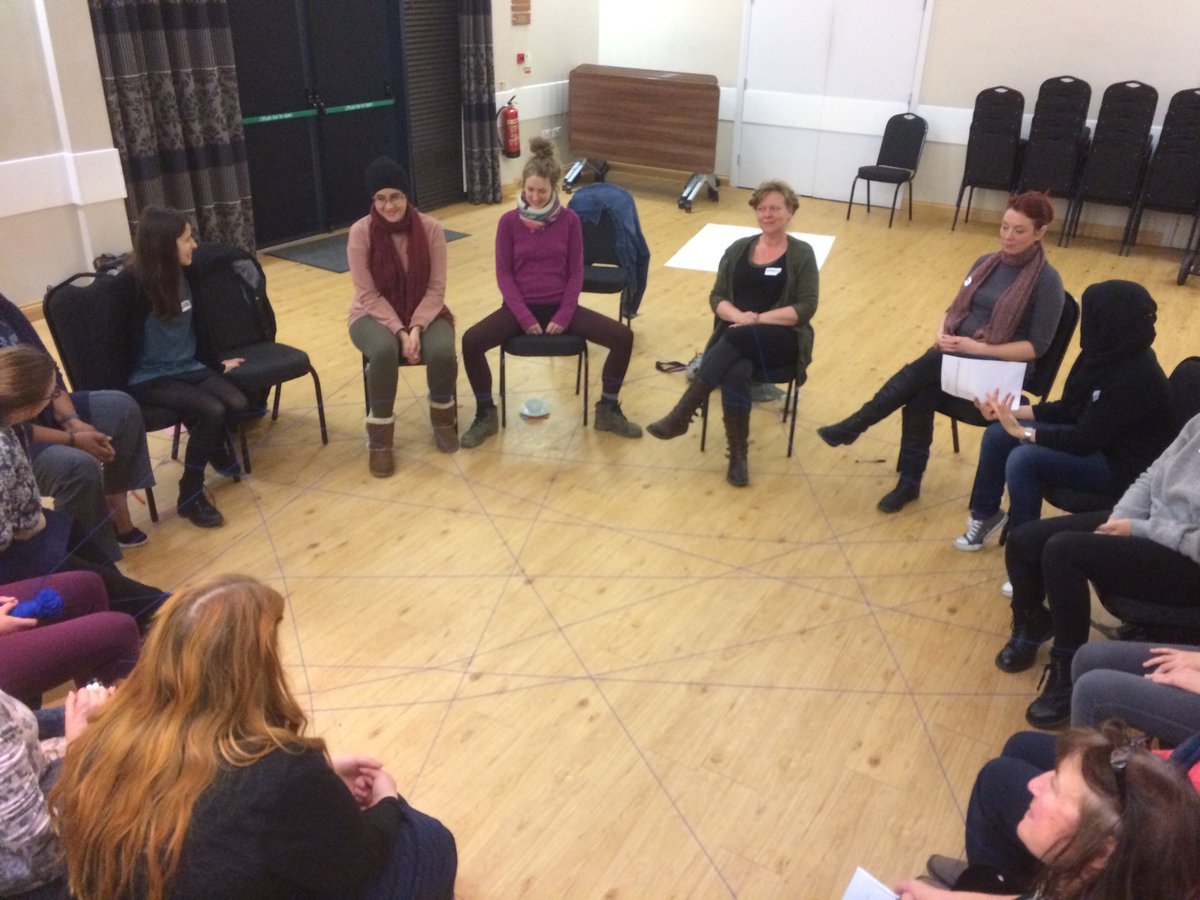It has been a bit of a mixed few weeks, and although there have been a few challenging events, I am happy to be able to end this blog entry with some positive and uplifting activities. We will get there in a moment!
In our final Women for Peace session, we threw a ball around the circle and remembered all the activities we have done throughout the ten weeks. Then we were given post-it notes of the activities to lay out on the floor in the order that we completed them. Following this, we spent time collaging, colouring or sculpting things whilst reflecting on what we will be taking away with us from the course. For me, the most important lesson learned is to speak out at future events and make my access needs loud and clear from the beginning rather than sitting through what proved to be an inaccessible setting for weeks. Then we were asked the same questions from session 1, including how confident we feel in challenging someone with extremist views, and how much we feel we can increase cohesion in our community. For this, we were invited to stand in a continuum line, which for me personally was disabling as I was not able to move around like the others and share my opinions with them. It felt like my comments from the previous week hadn’t been taken on board.
Finally, we worked as a group to think about what we might like to do next. Individually, we had to write a letter to ourselves to be sent off to us in six months’ time, not totally accessible exercise for someone with a visual impairment (both in terms of writing and reading it)! I was relieved that I had stuck it out for ten weeks, and this was the last one, given my growing feelings of exclusion. However, to my delight, soon after the course one of the facilitators of Women for Peace arranged to meet me to go through the course. As we reviewed each of the activities in turn, I informed her how it was or wasn’t inclusive for me and how it could be made inclusive. It was good to discuss my concerns and hopefully make the course more accessible for the future disabled participants, but I strongly feel that our expertise should be valued, and we – as disabled people – should be paid for sharing our knowledge. Doing anything other than this feels like the organisations, who have excluded us in the first place, are using our marginalisation to their advantage and this does not feel fair.
As well as the meeting with Women for Peace, I attended the Neurological Users and Carers Forum (NUCF) meeting, at the Leeds Teaching Hospital. We used to have monthly meetings but due to the ‘cuts’, our meetings are now reduced to quarterly ones. The group used to have a consultative position and inform service users’ views on the service received, however these days, even in these quarterly meetings, it feels that the staff running the group would much rather if we didn’t turn up and that it is a hassle for them to be present in the meetings. Plus, as a relatively new member of the forum, the staff are still not used to having me in the group, and often refer to handouts or screen and say: ‘as you can see’. I had to stop them and ask them to read out the content of the screen once or twice. So, all in all, like the others, I don’t feel valued but am keen to continue attending the group, because I feel it is through participating in similar groups that we can help to improve the service. In contrast to the NUCF meeting, in the evening of the same day, I went to the Community Committee meeting held in my Leeds council ward. I really enjoy going to these, where the councillors address the concerns of community members. I feel inspired every time I attend these meetings and always want to be involved more in my local community.
Another positive meeting was held for employers of personal assistants. A few of us meet up every so often in the Centre for Integrated Living to discuss any issues and PA-related experiences with each other and with a member of staff. I explained how I did not find the First Aid course inclusive from a disabled person’s perspective. I was pleased to present the case for needing a First Aid course for the employers as well as Mental Health First Aid course for both employers and employees. The group agreed with me and the CIL is going to look for trainers for delivering these courses.
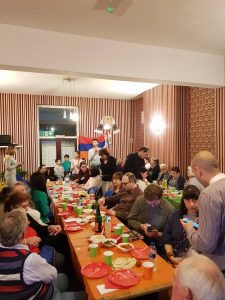
It’s good to have meetings and gatherings that uplift me. We attended an Armenian Easter-Party for the Armenian community in Leeds and surrounding areas. It was so lovely to see some old friends and meet new ones, a real taste of home! For the three hours that we were there, I felt part of a loving, supportive and accepting community and it was beautiful.
Culturally, I’ve seen a few films lately too. We went to see Sweet Country, an Australian western, set after the First World War, about an aboriginal man accused of murder. I found it thought provoking and there were some striking and disturbing parallels with today’s society, as well as it not having a typical Hollywood ending. A few of us also went to see Lady Bird. None of us had read about the film and were disappointed to find out it was a film about a teenager. I didn’t really enjoy the film at all, it’s not my kind of thing. I could see why there was an Oscar win for supporting actress, but I could have waited to see it on Netflix, rather than having spent money to see it!
Speaking of Netflix, I have been watching programs on energy healing, positive thinking and its links to happiness as well as a series on the nature of God, miracles and death in different religions. These documentaries have been interesting, and I feel so privileged and grateful to be on the path of working with the healing power of energies. In our healer Student Development group, we were taught about the basics of mindfulness and practised some guided meditations. The techniques the workshop leader guided us through managed to completely calm and ground me and leave me in the present. It was serene.
Continuing that theme, today we went to the Left Bank Centre for an afternoon of reflection. The meditation was based around an exhibition on the life cycle that was on for the Easter week in the centre, so we meditated on poems and pieces of literature about birth, youth, maturity and dying. Having had friends and acquaintances pass away over the last few months, this meditation felt timely for me. Going through the exhibition and the reflective space, it was good to reaffirm that death and birth are only a breath away and dying leads to rebirth and new possibilities – just as letting go of challenges and discrimination I faced earlier on lead me to more reflective and tranquil time, opening to new opportunities.
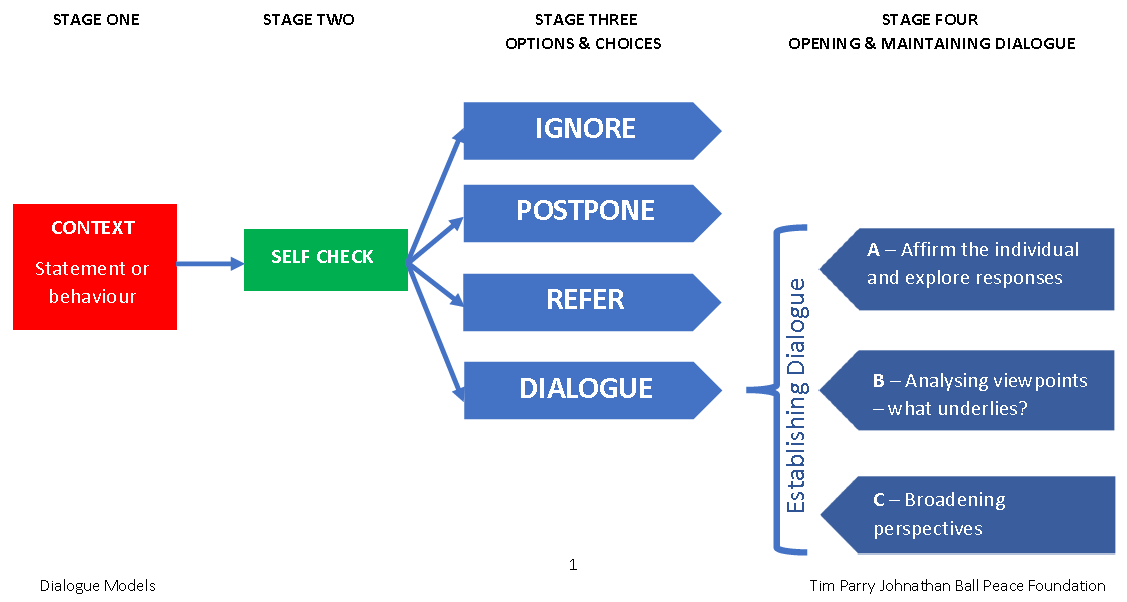 The Dialogue model is a useful way to address a comment that a person has made that we don’t feel comfortable with like a disablist comment/opinion. The model follows four stages of ignore, postpone, refer or dialogue in order to take us through a constructive dialogue about a topic. The ‘I’ Statements, on the other hand, are based on a non-judgemental model, where the person simply expresses how a certain conflict has made her feel and invites the other person to have a constructive discussion. I preferred the latter as it’s more about owning up to how one feels and taking responsibility for it instead of blaming the other. Following this, we came up with some conflict scenarios from personal experience in small groups. We then sat in two lines to do role plays with those topics, using our new dialogue models as tools to resolve the conflicts. I chose to use the statement ‘You don’t look blind’ for my scenario, which is often expressed in a complimentary way, however this is not received in the same way, at least by me. While the person role playing my scenario did not appear to realise the importance of ‘blind’ identity to my personhood, when acting out, I think the group understood the message.
The Dialogue model is a useful way to address a comment that a person has made that we don’t feel comfortable with like a disablist comment/opinion. The model follows four stages of ignore, postpone, refer or dialogue in order to take us through a constructive dialogue about a topic. The ‘I’ Statements, on the other hand, are based on a non-judgemental model, where the person simply expresses how a certain conflict has made her feel and invites the other person to have a constructive discussion. I preferred the latter as it’s more about owning up to how one feels and taking responsibility for it instead of blaming the other. Following this, we came up with some conflict scenarios from personal experience in small groups. We then sat in two lines to do role plays with those topics, using our new dialogue models as tools to resolve the conflicts. I chose to use the statement ‘You don’t look blind’ for my scenario, which is often expressed in a complimentary way, however this is not received in the same way, at least by me. While the person role playing my scenario did not appear to realise the importance of ‘blind’ identity to my personhood, when acting out, I think the group understood the message.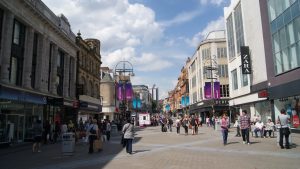 Outside the course, I participated in a focus group with some other equality hub members about how to make Leeds city centre more accessible. We had interesting ideas about the things we liked about Leeds and the things we didn’t like. From my perspective, I like open spaces such as Briggate and its pedestrian zone, and what I don’t like is the narrow pavements, especially when people leave their black, green and brown bins blocking the path. We also spoke of an ideal Leeds and what we would like to see. Recommendations included more lighting and safe spaces, audio signs and information (including bus/train timetables) and wider pavements. All in all it was a productive session for us, but much depends on how much is taken on board by the council when planning a more accessible Leeds.
Outside the course, I participated in a focus group with some other equality hub members about how to make Leeds city centre more accessible. We had interesting ideas about the things we liked about Leeds and the things we didn’t like. From my perspective, I like open spaces such as Briggate and its pedestrian zone, and what I don’t like is the narrow pavements, especially when people leave their black, green and brown bins blocking the path. We also spoke of an ideal Leeds and what we would like to see. Recommendations included more lighting and safe spaces, audio signs and information (including bus/train timetables) and wider pavements. All in all it was a productive session for us, but much depends on how much is taken on board by the council when planning a more accessible Leeds.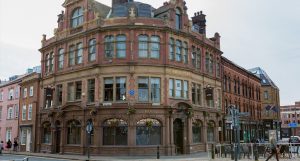 For the second time, David and I went to the historical talks held in
For the second time, David and I went to the historical talks held in 